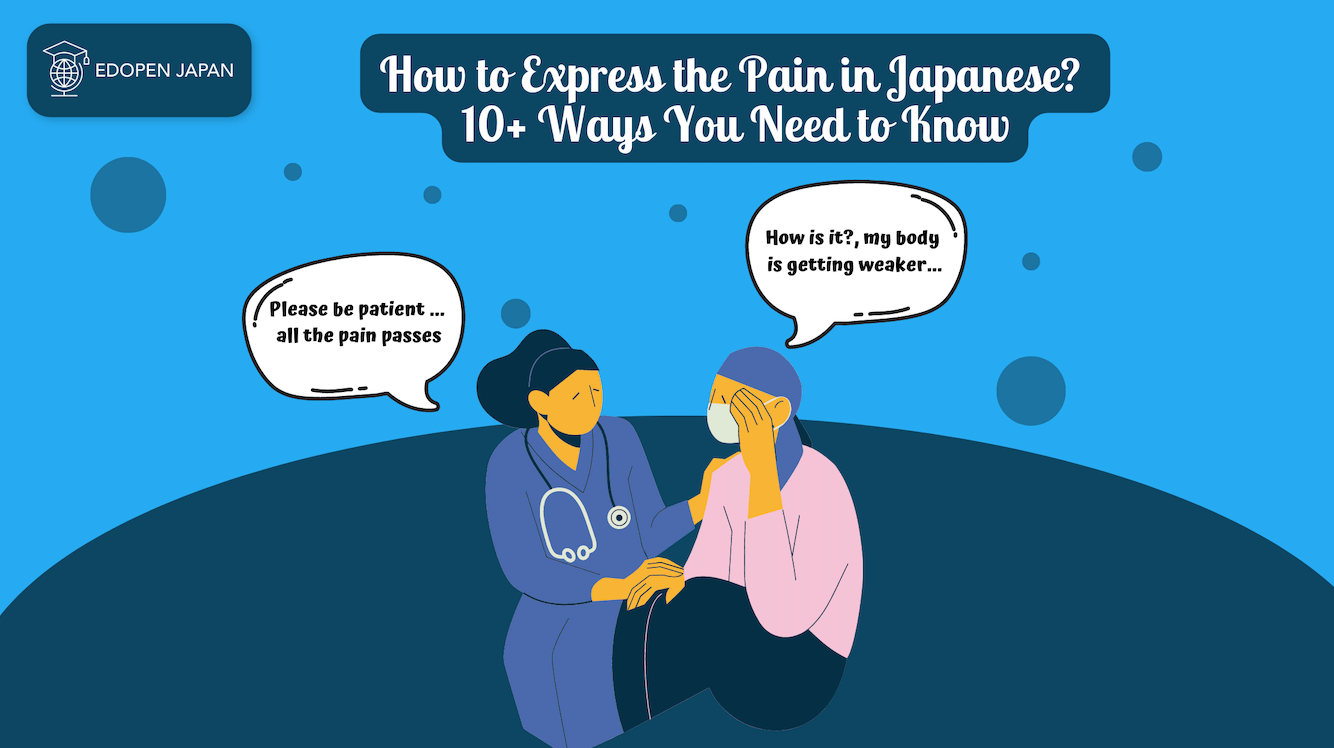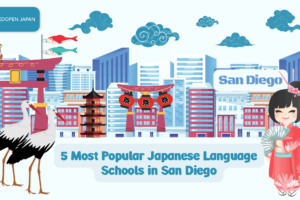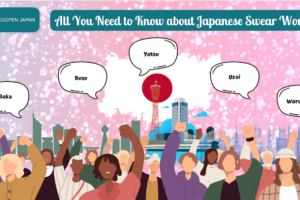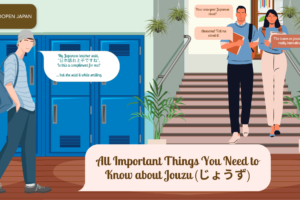If you lived in Japan, how would you answer or tell a doctor how you feel when you have pain? What would you say if they asked you to describe your feeling or pain in Japanese? If you are in Japan, you must be able to express “pain” in Japanese at some point. Therefore, in this article, I will show you how to properly express “pain” or “painful” or “illness” in Japanese.
In addition, if you want to learn Japanese from the ground up, our media is the right place for you. You will find many comprehensive and well-informed articles.
If you have any questions, please leave your comments below. We hope this article is helpful to you. Speaking of pain, there are specific words as well as onomatopoeia that work to describe pain. Let’s learn together here!
In addition, if you are currently studying Japanese language and culture, please read our recommendations below to improve your understanding of phrases, how they are used, and how to express things appropriately in Japanese.
Read also:
All Important Things You Need to Know about Jouzu (じょうず)
How are You in Japanese: All You Need to Know
11 Great Ways to Express Sorry in Japanese
Contents
How to describe “Pain” generally in Japanese?
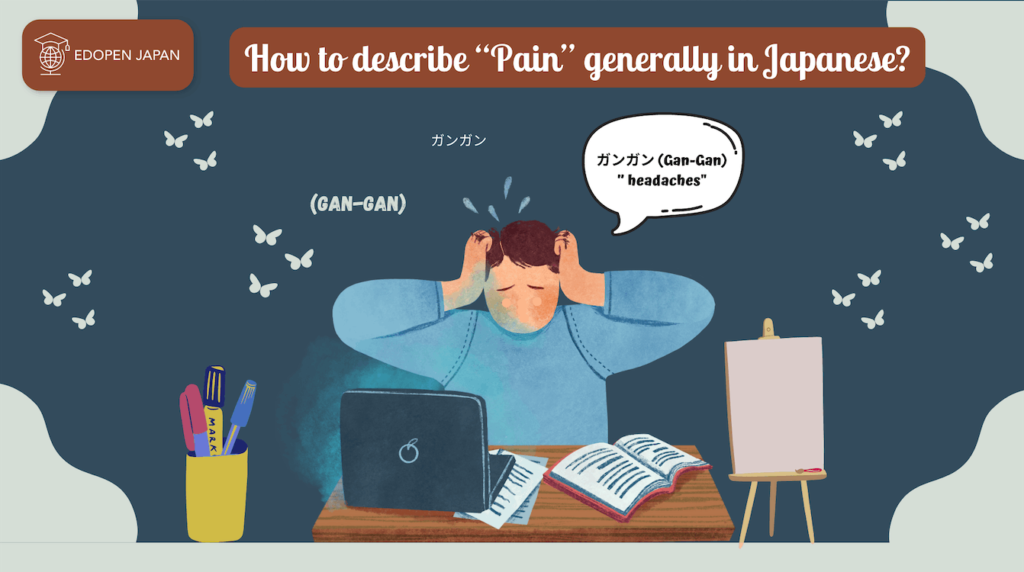
First of all, if you want to say that you physically feel “pain” in Japanese, the word itai (痛い、いたい) is the right word. In addition, you can use this word in any situation because it is the general word. Whether you are talking to a doctor or whenever you feel hurt and want to tell your friend or colleague what you are feeling.
The general word to say “pain” or “it hurts” in Japanese is “itai”. Please see the list below to learn how this word works in Japanese:
- Itai (痛い、いたい): It is an i-adjective (いー形容詞) that means pain, pain or hurt.
- Itami (痛み、いたみ): It is a noun form of Itai (i-adjective) that means pain or wound.
For a better understanding, please take a look at the following example of the sentences.
(1) 彼女は脇腹が痛いと言っていました。
Kanojo wa wakibara ga itai to itte imashita.
She said that her flank (side of stomach) is hurt.
(2) 彼は脇腹に痛みを感じた。
Kare wa wakibara ni itami o kanjita.
He felt pain in his flank.
How to describe specific “Pain” in Japanese?
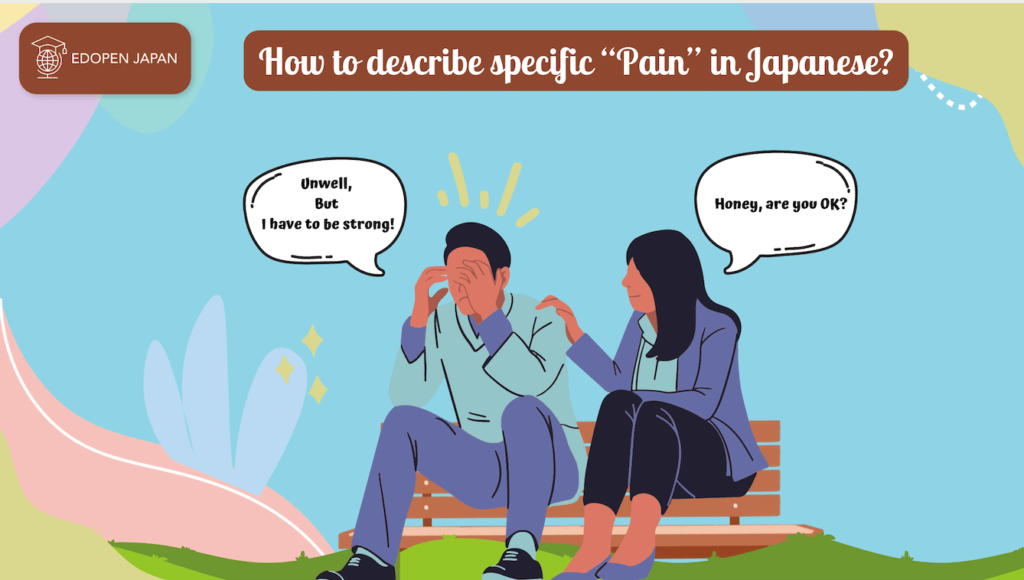
In this section you will learn more about how to express “pain” in Japanese. Why do you need to do this? Because if you express your feelings as accurately as possible, you will get the best treatment. Then you can avoid misunderstandings.
As mentioned earlier, Japanese people often use onomatopoeia to express what they feel. For example, if you have a headache or a toothache. This will make your expression much more precise and sound like a native Japanese.
(1) ガンガン (Gan – Gan or Gang – Gang): Pounding
The Japanese often use the expression “ガンガン (Gan-Gan)” to describe headaches. Please note that this expression only describes pain associated with headaches in Japanese, not in other languages. This expression means “throbbing” and “splitting” pain in Japanese.
When you have a cold, you also have a headache, or when you drink too much alcohol, your head feels so bad. This word is perfect for describing these conditions. Please see the example below to understand more about ガンガンする (gan-gan suru):
| (1) 寝不足のせいか、朝から頭がガンガンする。 Nebusoku no sei ka, asa kara atama ga gan-gan suru. Maybe because of lack of sleep, my head gets pounded from the morning. |
| (2)コーヒー飲み過ぎたせいか、頭がガンガンと痛んでいる。 Kōhī nomi sugita sei ka, atama ga gan gan to itande iru. My head feels so hurt, probably because I drank too much coffee. |
(2) ズキズキ (Zuki – Zuki): Throbbing

When you visit your dentist in Japan, it is very important that you remember this phrase. Instead of using a very general word like “Itai,” for example, please try to remember this phrase. Yes, if you feel a kind of throbbing pain in your tooth, just use this phrase.
This idiom means both severe and dull pain. The Japanese commonly use the phrase “zuki-zuki” to express toothache. Let’s look at the example below:
| (1) アイスクリームを食べ過ぎせいか、歯がズキズキと痛む。 Aisukurīmu o tabe sugi sei ka, ha ga zukizuki to itamu. My teeth are throbbing, probably because I eat too much ice cream. |
| (2) 料理する時に傷ついた指がズキズキと痛む。 Ryōri suru toki ni kizutsuita yubi ga zukizuki to itamu. My injured finger hurts when I cook. |
(3) チクチク (Chiku – Chiku): Prickling or Tingling
If you are hearing this phrase for the first time, what do you imagine when the Japanese say “chiku – chiku”? Then, when you open the dictionary to look up the meaning, you may find a word like “tingling,” “prickling,” and “stinging. There are 2 meanings of “チクチク (Chiku – Chiku)”. They are “itch” and “pain” feelings.
Let’s break down how this phrase works below. You may use it in the two conditions below:
(1) To express “itchy”: This happens when we wear clothes such as sweaters or when the tags on our new clothes hit our backs.
(2) To express “pain”: When we feel a kind of tingling in some part of our body, this phrase would be a good option as well.
In addition, you may also use this phrase to express the “pricking” and “stinging” sensation. Let’s see the example below:
| (1) 虫に刺されて、チクチクするんです。 Mushi ni sasa rete, chikuchiku suru ndesu. I’ve just bitten by insects and it’s so itchy. |
| (2) 運動不足せいか、脇腹がチクチクと痛む。 Undō busoku sei ka, wakibara ga chikuchiku to itamu. My flank hurts, probably because of a lack of exercise. |
(4) じんじん (Jin – Jin): Tingling Pain in Injury
When you are injured and the affected area that feels pain has constant pain as well as numbness at the same time, you can use this phrase, ジンジン (Jinjin). This kind of pain is usually caused by a serious illness or injury.
In addition to such a major injury, you may also experience numbness from other conditions. Let’s say you’ve been sitting for a long time and you feel numbness in your leg. In this case, you can also use this phrase. Please see the following example to learn more:
| (1) 公園で転んでできた傷がじんじんと痛む。 Kōen de koronde dekita kizu ga jin jin to itamu. The wound I got from my fall in the park feels hurt. |
| (2) なんか手がしびれて、じんじんする。 Nanka te ga shibirete, jin jin suru. Somehow my hands are numb and I feel it hurts. |
(5) キリキリ Kiri – Kiri): Stabbing
Please note that this phrase キリキリ (Kiri – Kiri) represents a sharp pain in the stomach. Japanese often use this phrase to describe stomach pain. Usually people say this phrase as キリキリ痛い (Kiri – Kiri Itai), which means the stabbing sensation of pain. When a woman gets her period, she can also use this to express the menstrual pain she feels.
As you have understood, the general phrase for stomach is only “itai. Nevertheless, “Itai” is only for dull or normal pain, very general. When you feel the pain, it is not normal. If the pain is like a sharp, stabbing, very constant pain in your stomach, use this phrase. Then you can tell the doctor exactly what it is. That way you can get the best treatment and the right medicine.
| (1) 急に胃がキリキリと痛む。 Kyū ni i ga kirikiri to itamu. Suddenly my stomach hurts. |
| (2) 緊張しすぎて、胃がキリキリと痛む。 Kinchō shi sugite, i ga kirikiri to itamu. I’m so nervous that my stomach hurts. |
(6) ひりひり (Hiri – Hiri): Burning Pain
ひりひり (Hiri – Hiri) is a kind of burning sensation of pain usually caused by a wound, burn, or sore. If you feel a burning sensation because of sunburn, you can use this phrase. Usually this phrase is used for the skin.
In addition, this phrase can be used to describe both soreness and irritation. You can use this phrase not only for sunburn, but also for a sore throat.
| (1) 足の先が濡れて、ひりひりと痛んだ。 Ashi no saki ga nurete, hirihiri to itanda. The tip of my foot got wet and it hurt. |
| (2) 日焼けしたところがヒリヒリと痛む。 Hiyake shita tokoro ga hirihiri to itamu. The sunburned area feels hurt. |
(7) ムカムカ (Muka – Muka): Queasy Sensation
If you eat some kind of oily, spicy, and greasy food, you may soon feel that your stomach hurts. This time I would like to introduce you to the appropriate phrase for this condition. This is ムカムカ (muka-muka). Japanese often say it as ムカムカする (muka-muka suru).
However, it is slightly different from kiri-kiri (stabbing pain), which would also be commonly used for stomach pain. Compared to stabbing pain, the pain sensation of this phrase, ムカムカ (muka-muka) is more queasy and followed by nausea.
| (1) 食べ過ぎて胃がむかむかする。 Tabe sugite, i ga mukamuka suru. I eat too much and my stomach feels queasy. |
| (2) 魚のにおいでむかむかする。 Sakana no nioi de mukamuka suru. The smell of fish makes me sick (disgusts me). |
(8) くらくら (Kura – Kura): Dizzy
Have you ever felt dizzy? In Japanese, there is a special onomatopoeia for dizziness. Yes, it is くらくら (Kura-Kura). People often say “dizzy” as くらくらする (kura-kura suru) in Japanese. As you can imagine, the condition is when you cannot stand because your head feels like it is spinning.
On the other hand, you can also use this phrase when you feel uncomfortable or when you are amazed to see something so fascinating. Please see the following example for a deeper understanding:
| (1) コーヒーを飲むと、くらくらする人もいます。 Kōhī o nomu to, kurakura suru hito mo imasu. Some people feel dizzy when they drink coffee. |
| (2) 明日までに終わらせないといけないレポートがあまりにもたくさんで、頭がくらくらする。 Ashita made ni owarasenaito ikenai repōto ga amarini mo takusan de, atama ga kurakura suru. There are so many reports that I have to finish by tomorrow, and I’m dizzy. |
(9) パンパン (Pan – Pan): Stiff Sensation
パンパン (pan-pan or pang-pang) is an onomatopoeia for stiffness. Because you may feel that some parts of your body are stiff and painful at the same time due to your physical activities. For example, your grandmother has to take care of her grandchildren all day when they come to visit her at home. Then she says that her shoulders are so stiff and painful. Then this phrase is the right option to use.
On the other hand, this phrase also represents “full condition”. For example, you have eaten 3 boxes of large size Pizza then you feel that you cannot move anymore since your stomach is full.
This phrase suits that condition. According to the dictionary, there are 3 meanings of this phrase as follows:
① The sound of clapping hands or hitting things.
② The sound of things exploding.
③ Things or usually stomachs that seem to be bulging out like they are about to burst.
Please look at the following example for a better understanding.
| (1) 手をパンパンと叩く。 Te o panpan to tataku. I clap my hands. |
| (2) どこかでパンパンと大きい音が聞こえた。 Doko ka de panpan to ōkī oto ga kikoeta. I heard a loud noise somewhere. |
| (3) もうお腹がパンパンで、これ以上は食べられないんです。 Mō onaka ga panpan de, kore ijō wa taberarenai ndesu. I am already full, I can’t eat more than this. |
(10) ゴロゴロ (Goro – Goro): Unpleasent Feeling in Eyes
ゴロゴロ (goro-goro) is a phrase usually used to describe the unpleasant sensation in the eyes. It is usually due to the intrusion of dust and dirt, contact lenses, and dry eyes. This would usually make you feel uncomfortable, such as rough eyes or hitting something when you blink, or a foreign body feeling that you cannot remove inside your eyes.
The symptoms can be made worse by inflammation and allergic reactions. You can use this phrase to describe your feelings to your eye doctor.
| (1) 目がゴロゴロする、汚れが入ってるのかなあ。 Me ga goro-goro suru, yogore ga haitteru no ka nā. I wonder if dirt is inside my eyes, they feel gritty. |
| (2) レンズを使うと、目がゴロゴロと感じる。 Renzu o tsukau to, me ga goro-goro to kanjiru. When I use a lens, my eyes feel rugged. |
(11) しょぼしょぼ (Syobo – Syobo): Sore Sensation in Eyes
Next is the other possibility of feeling pain in the eye. This is しょぼしょぼ (syobo-syobo), which means sore eyes caused by fatigue. In some cases, you may feel that your eyes are swelling. This pain usually happens to anyone who works on the computer for a long time.
Then we need to visit an ophthalmologist to solve this pain. Usually, the doctor will give you moisturizers or certain medications and treatments to make your eyes feel better.
| (1) 目がしょぼしょぼして、スマホの画面が見えにくくなる。 Me ga syobo syobo shite, sumaho no gamen ga mienikuku naru. My eyes are tired, it becomes difficult to see the screen of my smartphone. |
| (2) 最近、目が疲れているみたい、しょぼしょぼしたりしない? Saikin, me ga tsukarete iru mitai, syobo-syobo shitari shinai? Your eyes seem to be tired lately, don’t you feel sore eyes? |
(12) ムズムズする (Muzu – Muzu): Tickle or Itchy Sensation in Nose or Eyes
ムズムズ (muzu-muzu) is a phrase that describes both a tickle and an itch. Usually this occurs in the eyes or nose. In the case of the eyes, this phrase usually represents mild symptoms of the eyes, yet most commonly happen to anyone is an itchy eye or rubbed feeling.
This is usually caused by bacterial infections and allergic symptoms such as “pink eye” and “hay fever. If the symptoms continue for several days, such as eye fatigue, it means that we may have an eye disease. Here we need to tell the doctor to get the best treatment.
In addition, during the spring season we may feel our nose tickling, for example, from contact with pollen. This is an allergic symptom similar to the eye that I explained earlier. The use of this phrase is also correct. Please see the example to understand more.
| (1) 昨日から鼻がムズムズするの、花粉症かなあ。 Kinō kara hana ga muzumuzusuru no, kabunshō ka nā. I wonder if it’s hay fever that my nose gets stuffy from yesterday. |
| (2) なんだか目がむずむずする、とてもかゆい。 Nandaka, me ga muzumuzu suru, totemo kayui. Somehow, my eyes are tickling, it is really itchy. |
How to say “Pain” in Japanese?
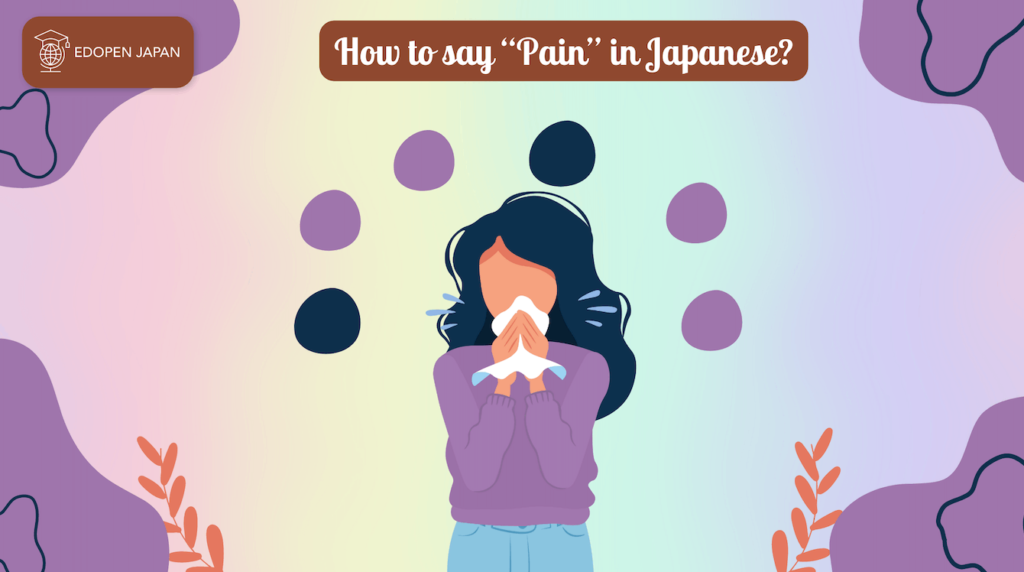
There are many ways to express “pain” in Japanese. The following is a summary list of some pain and pain-related vocabulary in Japanese that you can use to describe the pain you are feeling.
| Japanese | Romaji | Meaning |
| 1. 痛み (いたみ) | Itami | pain, damage, bruise, ache, sore, smart |
| 2. 疼痛 (とうつう) | Tōtsū | throbbing pain |
| 3. 苦痛 (くつう) | Kutsū | agony |
| 4. 苦しみ (くるしみ) | Kurushimi | suffering, agony, distress, burden, anguish |
| 5. 傷み (いたみ) | Itami | ache |
| 6. 悲哀 (ひあい) | Hiai | sorrow, sadness, woe, grief, anguish |
| 7. 憂苦 (ゆうく) | Yūku | trouble, distress, sorrow, anguish, grief |
| 8. 憂悶 (ゆうもん) | Yūmon | anguish, distress, agony, grief, wretchedness |
| 9. 受難 (じゅなん) | Junan | suffering, passion, affliction, discomfort, anguish |
| 10. 苦心 (くしん) | Kushin | trouble, hard work, diligence, anxiety |
| 11. 憂患 (ゆうかん) | Yūkan | sorrow, worry, distress, anguish, grief |
Conclusion
Finally, upon further reflection, the main points of today’s article can be summarized as follows:
- The general word to say “pain” or ” it hurts” in Japanese is “痛い (itai)”.
- There are certain onomatopoeia in Japanese to describe the sensation of pain in a part of the body.
- Memorization of the specific phrase will be very useful for your Japanese to be more accurate.
- Please make a note and scroll up the specific phrase above that describes your feelings.
- Please keep the example sentences in mind or challenge yourself to do the other example.
Thank you for reading all parts of this article. Please feel free to drop your comments below if you have any further questions etc. I hope you enjoy learning Japanese and Japanese culture in our media. See you in the next articles.

